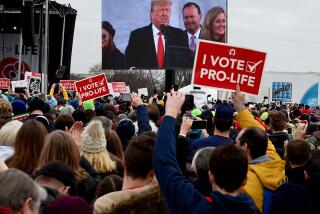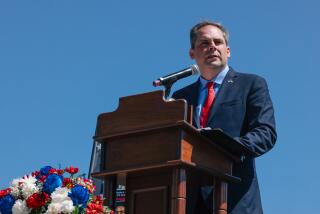Foes Charge Gephardt Plays to Constituencies : Self-Described Candidate of Change Criticized for New Pro-Abortion, Anti-Establishment Stands
- Share via
DES MOINES — Two weeks ago, Missouri Rep. Richard A. Gephardt entered a delicatessen in Concord, N.H., to greet the patrons and ask for their support. A young man had a question. Are you “still pro-life?” he wanted to know. Gephardt replied: “Yes.”
In fact, the Democratic presidential candidate is now pro-choice on abortion. He told reporters who learned of the incident that he did not know what the man meant by “pro-life” and had answered hastily.
But whatever his intention, the misleading reply reinforces his opponents’ intensifying criticism that he tailors his positions according to their appeal with different constituencies. The criticism has mounted since he moved to the front of polls in Iowa earlier this month, and voters are beginning to ask him about it on the campaign trail.
Candidate of Change
At an appearance at Boston University on Wednesday, about 300 students listened to Gephardt describe himself as the candidate of change. During a question and answer period, a student stood up and asked the candidate to explain his stand on abortion. Gephardt once favored a constitutional amendment to ban abortion but now favors freedom of choice. “What about the change in you?” demanded the student, who said he came from Gephardt’s congressional district in Missouri.
Gephardt likened his switch to the late Robert F. Kennedy’s decision to oppose American involvement in Vietnam after initially favoring it. He said he decided 2 1/2 years ago that the battle over the legality of abortion was not going anywhere and that he should instead promote programs like sex education to help prevent unwanted pregnancies.
“The test is what in your heart and mind is right. . . “ he said.
Later, meeting with reporters, he said that the change was not inspired by his political ambitions. When asked whether he believes a Democrat could win the party’s nomination with an anti-abortion position, he replied: “I don’t know.”
Talks of ‘Pro-Life’
Referring to his encounter with the Concord man, he said: “I don’t know what he meant by that (pro-life). Being pro-life is trying to help people avoid unwanted pregnancies and to have viable options to abortion that they might want to choose. We didn’t have time to go into a long explanation of positions. . . . “
In addition to his position on abortion, Gephardt is also regularly asked by reporters to justify his new “anti-Establishment” self-portrait. During the last month, he has railed against “the Establishment”--editorial writers and academics who criticize his trade policy--in stump speeches across Iowa.
Gephardt, however, is a Washington insider. He is a leader in Congress, and his candidacy has been endorsed by 80 of his congressional colleagues.
Appearing with 42 congressmen on the state Capitol steps here Thursday, Gephardt said: “A lot of people have said to me in the past few days, ‘You say you want to take on established wisdom. . . . How can you say that when you’re part of that Establishment as leader in Congress?’ ” He said he has stood for “new directions and change” in Congress on such issues as tax reform and trade. “Don’t look at where I sit,” he said. “Look at where I stand. . . . “
Trade Policy Attacked
Gephardt’s rivals have argued that his trade policy, which calls for sanctions against countries that restrict imports of U.S. goods, would trigger a trade war that ultimately would hurt American exports. The attacks appear to have made an impact with voters. During a campaign swing this week, audiences repeatedly asked him whether his policy might hurt farm exports. He told them that the policy might in fact open u1881173359products.
“You’re taking a lot of heat on the protectionist trade bill,” said a man at a fund-raiser in Minneapolis. “Do you see yourself changing?”
“Oh, no,” Gephardt replied. He said his policy would simply give the President the option to take “measured, modest penalties” against imports from countries that refuse to lift their trade barriers on American goods. “The evidence is that when we have stood up, other countries have opened up,” he said.
More to Read
Get the L.A. Times Politics newsletter
Deeply reported insights into legislation, politics and policy from Sacramento, Washington and beyond. In your inbox twice per week.
You may occasionally receive promotional content from the Los Angeles Times.











